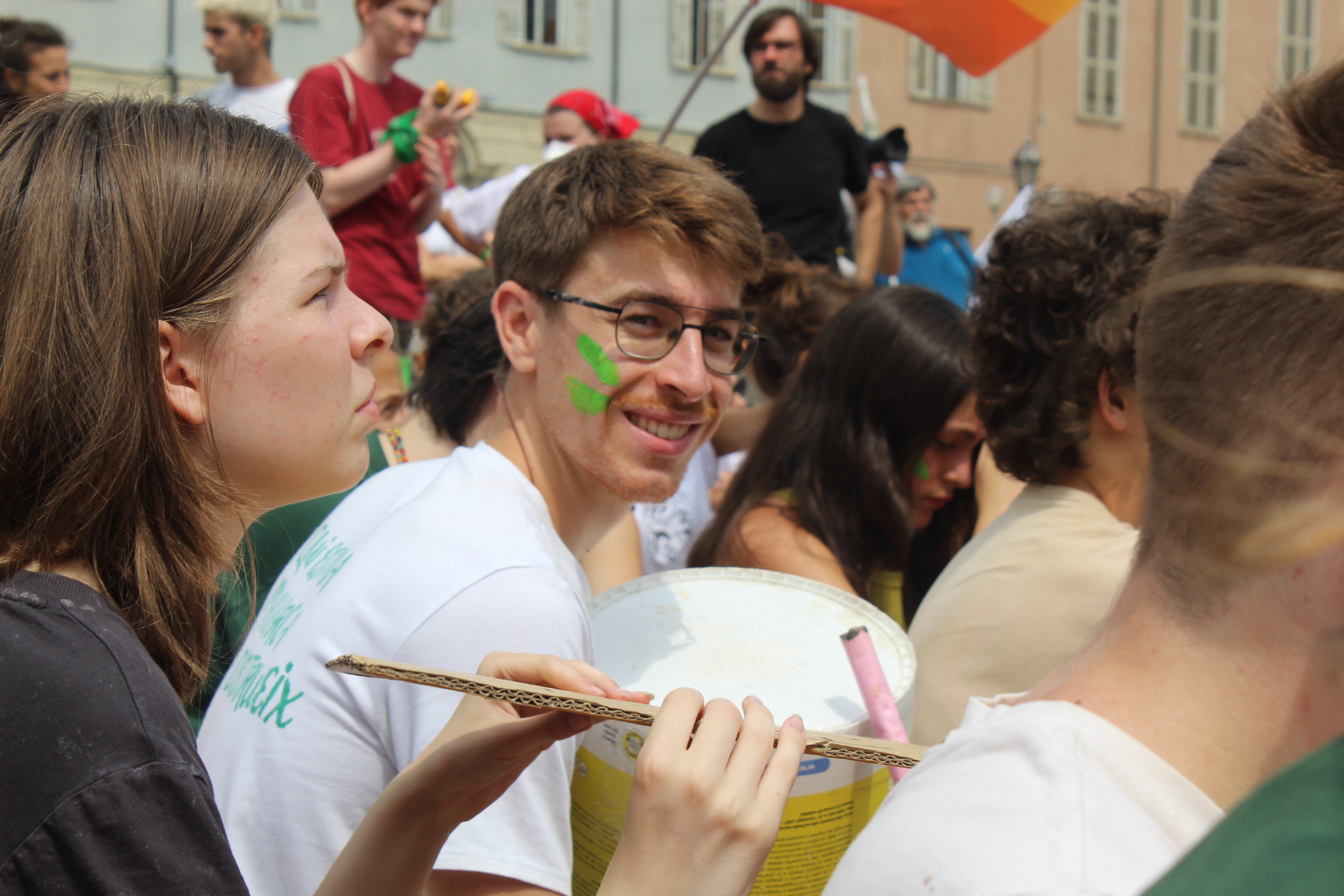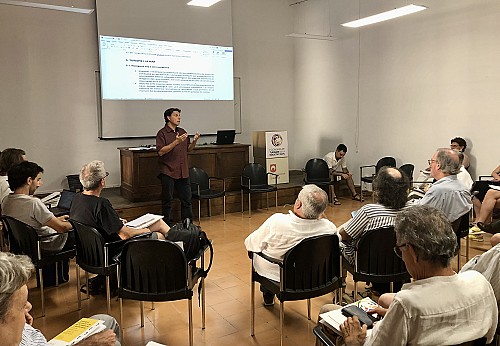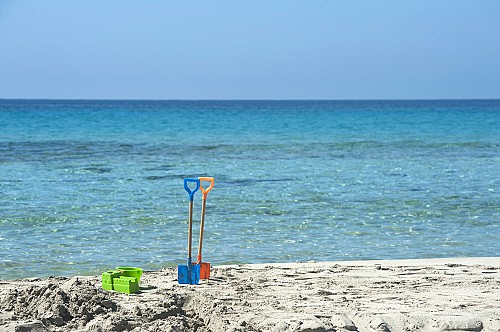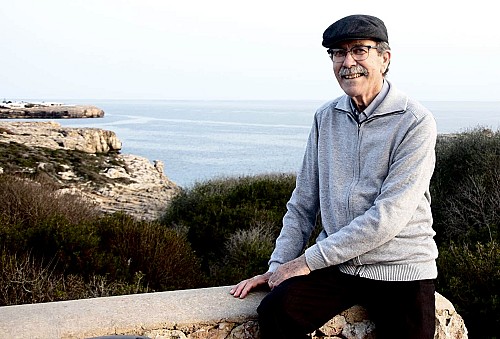"If we want to face the impacts of tourism, there is only one solution: degrowth"
Published 06.11.2023
Share

Pere Joan Femenia (Palma, 1999) is the spokesperson in Mallorca for Youth for Climate - Fridays For Future, a social and environmental movement formed by young people from all over the world. Its main objective is to raise awareness in society about the effects of climate change and push to place the climate emergency as a priority on the political agenda. This October, it was part of the organization of and spokesperson for the social counter-summit Less tourism, more life, organised as a reaction to the European summit that brought together EU tourism ministers in Mallorca.
ONE OF THE OBJECTIVES OF THE SOCIAL CONTRA-SUMMIT OF TOURISM IS TO SHOW THE TRUE FACE OF TOURISM IN THE ISLANDS. WHAT IS THIS FACE?
The tourism model on which our economy is based has been historically constructed and determined by economic and political agents. This has conditioned the development of a model that is governed by economic growth, ignoring the social, ecological, climatic, and labour impacts, for example. Thanks to social movements in recent years we have begun to talk about the "true face of tourism". No one denies that tourism has brought progress and benefits, but the current mass tourism model has caused a degradation of the welfare of the population. This model has social impacts because it affects our way of living and moving around. It affects housing and our life projects when we want to buy a house. It contributes to climate change since infrastructures such as airports, ports, and roads are being expanded. It accentuates the problems of shortages of water, energy, and food resources that we are not able to produce here. It affects identity, when tradition and local production are not promoted or when the morphology of the city is changed with multinational and tourist stores. It does not produce wealth but has increased inequalities and the population at risk of poverty it has repercussions for the health of the territory and our health, both through direct pollution from activities such as mega-cruises, and through mental problems due to the social discomfort that they can generate.
ARE THE BALEARIC ISLANDS AND THEIR SEA PARTICULARLY VULNERABLE TO THE EFFECTS OF CLIMATE CHANGE?
Scientific studies place the Balearic Islands as one of the focal points of climate change due to their geographical location, which accentuates the problems of extreme temperatures, drought, extreme weather phenomena, etc. This will condition all sectors and ways of life, starting with tourism, which could fall more than 8% because of climate change. The primary sector is already being affected by food production losses due to climate problems. People’s health is suffering too; heat waves alone caused 11,300 deaths in Spain in 2022. The sea is also especially vulnerable because it plays a key role in mitigating climate change by absorbing excess heat and acting as a carbon sink. Even so, the disproportionate increase in global temperatures could lead to a tipping point causing an aquatic climate that would not be compatible with the life of our ecosystems. They would die. Posidonia would die. This would have irreversible effects, changing our ecosystems and ways of life.
The sea plays a key role in mitigating climate change by absorbing excess heat and acting as a carbon sink.
DO YOU THINK THAT THE SOCIETY OF THE ISLANDS IS AWARE OF THIS REALITY?
No. The population is aware that climate change is a problem but is not aware of the real consequences of the climate crisis. The general population is unaware of the problems of food production on a global scale; the problem of climate displacement; the deaths caused by climatic phenomena; or the impacts on hunger, health, and the economy.
OUR SEA IS PERHAPS THE GREATEST TOURIST ATTRACTION OF THE ISLANDS. ON THE OTHER HAND, ITS CONSERVATION IS NOT YET AT THE CENTRE OF THE POLITICAL DEBATE. DO YOU THINK THAT, IN A WAY, WE LIVE WITH OUR BACKS TURNED TO THE SEA?
The sea is seen, even today, as a business space in which to trade and build large boats for tourism and leisure activities, a space for fishing activities and sailing, etc. It is only recently that new visions of the sea are being put forward, as a space full of life which has numerous opportunities for scientific research and is a key agent in the fight against the climate crisis. In recent years, tentative progress is being made in the protection of spaces and the declaration of landscape and natural heritage, but we are still far from the global objectives that aim to protect 30% of the oceans.
ALL HUMAN ACTIVITY HAS AN IMPACT. TOURISM MOVES BILLIONS OF PEOPLE AROUND THE WORLD, FROM MORE AND MORE COUNTRIES... DO YOU THINK IT IS POSSIBLE TO ACHIEVE ENVIRONMENTALLY SUSTAINABLE TOURISM? AND, IF SO, THROUGH WHICH LINES OF ACTION?
Whether sustainable tourism exists is an open debate. The current model is far from being so, but there are many ways to move towards it. We can divide it into the different phases of tourism: transport, the place, and the activity. Transportation, or mobility, must be directly affected by the reduction in the frequency of domestic, regional, and long-haul flights; we must evolve towards tourism that travels less, is more local, and uses less polluting means of transport. The second is the load study. No city, island, or territory in the world can accommodate a large number of tourists, since no territory has unlimited resources, and the production and transport of goods and resources have a huge environmental impact. The third has to do with what is consumed: whether they are products with a low carbon footprint and whether the activity carried out has an impact on the territory and ecosystems.
Whether sustainable tourism exists is an open debate. The current model is far from being so, but there are many ways to move towards it.
The expectation is that 2023 will end with a new record number of tourists in the Balearic Islands, exceeding 17 million. Is it time to decrease?
If we want to face the challenges of the future and the impacts that tourism has on the territory and the population there is only one solution: degrowth. For years, the government has been asking for a study of the carrying capacity of the island's resident and floating population. We know that the biophysical limits have been exceeded for years. Just look at the data: The Balearic Islands only produces 15% of the food it consumes. We do not have water resources to reach the population and we need to desalinate water in large quantities. We do not produce enough energy for everyone. The answer is no. We do not have a territory that can accommodate 17 million tourists. What we do not know is what the real limits of the islands are.
HOW DID YOU GET INTO ENVIRONMENTAL ACTIVISM?
It wasn’t until I was 17 and joined Twitter that I began to be informed on current events and aspects of climate change. I read up on it and became more conscious of the issues, asking myself more and more why nothing was being done about this problem if it affects us all?
In 2019, Fridays For Future and the first climate protests happened. I was presented with the opportunity to get involved with a climate fight. In Mallorca, together with other young people, relative strangers, we created the group and started the climate activism that is still going on today.
WHAT IS YOUR RELATIONSHIP WITH THE SEA?
Despite living on an island, I have never had a direct relationship with the sea, beyond going to the beach in the summer.
Quick test for sea lovers:
A book: One Piece, by Eiichiro Oda
An image that evokes the Balearic Islands: The sargantana 🦎
A marine species: The stingray
A person or organization of reference: GOB
A beach: Caló de s'Estaca
Optimistic, realistic, or pessimistic? I consider myself a realist.
Marilles in the media
- 16/10/2025 Cadena SER: "El III Foro Conversa Turisme i Sostenibilitat posa la gestió de l'aigua en el centre del debat sobre el turisme"
- 09/09/2024 EFE Verde: "Turismo de barco, ¿cómo reducir su impacto si desconocemos sus dimensiones?"
- 21/07/2024 El Periódico: "El sector turístico vira con timidez hacia la sostenibilidad"




